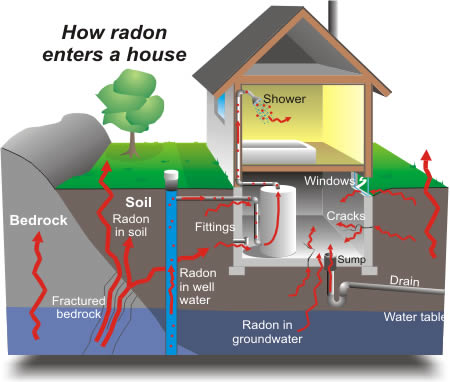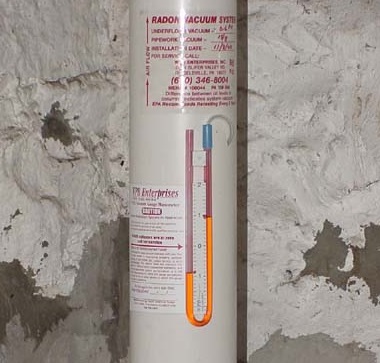Get a radon test before you buy your new home

Why you should test for Radon Gas
Testing for radon gas is the only way to know if you and your family are at risk. Radon is a cancer-causing, radioactive gas. You can’t see radon, you can’t smell it or taste it. It may be a problem in your home or the home your planning on buying. Radon gas is estimated to cause many thousands of deaths each year. That’s because when you breathe air containing radon gas you can get lung cancer. In fact, the Surgeon General has warned that radon gas is the second leading cause of lung cancer in the United States today. Only smoking causes more lung cancer deaths. If you smoke and your home has high radon gas levels, your risk of lung cancer is especially high.
High Level of Radon Gas?
Since there is no known safe level of radon gas, there can always be some risk. But the risk can be reduced by lowering the radon gas level in the home. There are several proven methods to reduce radon gas in the home, but the one primarily used is a sub-slab vent pipe system with exhaust fan unit, which pulls radon gas from beneath the house and vents it to the outside. This type system does not require major changes to the home. The cost of reducing radon gas in the home depends on how the home was built and the extent of the radon gas problem. Most homes can be remediated for $800 to $1,200.

Is your Radon Mitigation System configured correctly?
Ok … so the home you’re purchasing already has a Radon Mitigation System installed. Did you know that home owners are allowed to install their own systems? This inspector has seen many system installations where installation protocols are not followed, components are missing, or sometimes dangerous conditions are present. I have tested for Radon Gas in homes with existing Radon Systems installed where elevated levels of Radon was present.
A Radon mitigation system equipment inspection is intended to determine if an existing installed system is inadequately configured and may need to be repaired or upgraded. Since a ASHI Home Inspection does not include evaluation of installed Radon Systems, you should consider getting an existing system if present inspected for piece of mind. See the average of all Radon tests taken by PA Zipcode
RADON MYTHS
MYTH: Scientists aren’t sure radon really is a problem.
FACT: Although some scientists dispute the precise number of deaths due to radon, all major health organizations (like the Centers for Disease Control, the American Lung Association and the American Medical Association) agree with estimates that radon causes thousands of preventable lung cancer deaths every year.
MYTH: Radon testing is difficult, time consuming and expensive.
FACT: Radon testing is easy. You can hire a qualified radon test company.
MYTH: Homes with radon problems can’t be fixed.
FACT: There are simple solutions to radon problems in homes. Hundreds of thousands of homeowners have already fixed radon problems in their homes. Radon levels can be readily lowered for about $800 to $2,500 (with an average cost of $1,200).
MYTH: Radon only affects certain kinds of homes.
FACT: House construction can affect radon levels. However, radon can be a problem in homes of all types: old homes, new homes, drafty homes, insulated homes, homes with basements, homes without basements. Local geology, construction materials, and how the home was built are among the factors that can affect radon levels in homes.
MYTH: Radon is only a problem in certain parts of the country.
FACT: High radon levels have been found in every state. Radon problems do vary from area to area, but the only way to know your radon level is to test.
MYTH: A neighbor’s test result is a good indication of whether your home has a problem.
FACT: It’s not. Radon levels can vary greatly from home to home. The only way to know if your home has a radon problem is to have it tested.
MYTH: It’s difficult to sell homes where radon problems have been discovered.
FACT: Where radon problems have been fixed, home sales have not been blocked or frustrated. The added protection is sometimes a good selling point.
MYTH: I’ve lived in my home for so long it doesn’t make sense to take action now.
FACT: You will reduce your risk of lung cancer when you reduce radon levels, even if you’ve lived with a radon problem for a long time.
Accurate Home & Termite Inspections
(717) 583-2914
151 W. Chocolate Ave, Ste 145, #31, Hershey, PA 17033
AccurateInspecting.com
Serving Central Pennsylvania and these surrounding cities:
Harrisburg, Hershey, Hummelstown, Middletown, Annville, Lebanon, Palmyra, Lancaster, Lititz, Manheim, Elizabethtown, Mt Joy, Camp Hill, Mechanicsburg, New Cumberland, York
